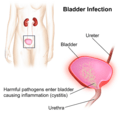Cystitis facts for kids
Cystitis is a common infection that affects your bladder. Your bladder is like a balloon inside your body that holds pee until you're ready to go to the bathroom. When you have cystitis, this balloon-like organ gets irritated and swollen because of tiny germs, usually bacteria. It's more common in girls and women, but boys and men can get it too. People of all ages can experience cystitis.
Contents
What is Cystitis?
Cystitis is a type of urinary tract infection (UTI) that specifically targets the bladder. Imagine your bladder as a small, stretchy bag that stores urine. When bacteria enter this bag and start to grow, they can cause an infection. This makes the bladder wall become red and swollen, which can be quite uncomfortable.
What Causes Cystitis?
Most cases of cystitis are caused by bacteria that normally live in your gut. These bacteria can sometimes travel from the area around your bottom to the opening where pee comes out (the urethra). Because the urethra is shorter in girls and women, it's easier for bacteria to reach the bladder.
Other things that can lead to cystitis include:
- Not drinking enough water, which means you don't pee often enough to flush out bacteria.
- Holding your pee for too long.
- Certain medical conditions that affect how your bladder works.
- Sometimes, irritation from soaps or bubble baths can also make the bladder more likely to get infected.
How Do You Know You Have It?
Cystitis can cause several uncomfortable symptoms. If you notice any of these, it's important to tell a trusted adult so you can see a doctor.
Common signs of cystitis include:
- A strong, constant urge to pee, even if you just went.
- A burning or stinging feeling when you pee.
- Peeing very small amounts frequently.
- Cloudy, dark, or strong-smelling pee.
- Pain or pressure in your lower tummy, just above your pubic bone.
- Feeling tired or unwell.
- Sometimes, a low-grade fever.
How is Cystitis Treated?
If a doctor thinks you have cystitis, they will usually ask for a small sample of your pee. This sample is checked for bacteria and other signs of infection.
The most common treatment for bacterial cystitis is antibiotics. These are special medicines that kill bacteria. It's very important to take all the medicine exactly as the doctor tells you, even if you start feeling better. This helps make sure all the bacteria are gone and prevents the infection from coming back.
Besides medicine, drinking plenty of water helps flush out the bacteria from your bladder. Resting and avoiding irritating products can also help you feel better.
How Can You Prevent Cystitis?
There are several simple things you can do to help prevent cystitis:
- Drink plenty of water: This helps your body make enough pee to regularly flush out bacteria from your bladder.
- Don't hold your pee: Go to the bathroom as soon as you feel the urge.
- Wipe from front to back: After going to the bathroom, especially after a bowel movement, always wipe from the front towards your back. This helps prevent bacteria from the bowel area from reaching the urethra.
- Take showers instead of baths: Or, if you take baths, avoid using harsh soaps, bubble baths, or bath bombs that can irritate the urethra.
- Wear cotton underwear: Cotton allows air to circulate, which helps keep the area dry and less friendly for bacteria.
Remember, if you think you might have cystitis, it's always best to talk to an adult and see a doctor. It's a common condition that can be easily treated!
Images for kids
-
Multiple bacilli (rod-shaped bacteria, here shown as black and bean-shaped) shown between white blood cells in urinary microscopy. These changes are indicative of a urinary tract infection.
See also
 In Spanish: Infección urinaria para niños
In Spanish: Infección urinaria para niños
 | Bessie Coleman |
 | Spann Watson |
 | Jill E. Brown |
 | Sherman W. White |




